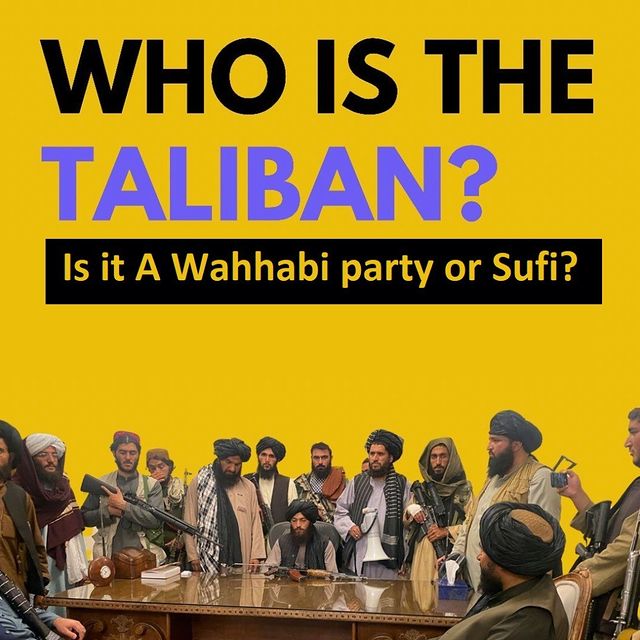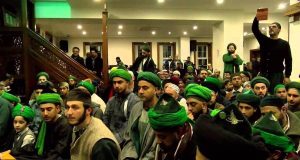The Taliban movement cannot be viewed in isolation from its spatial and temporal surroundings or from the history of the country in which it originated, as all researchers concerned with Islamic movements prove, especially those who had a share of visiting Afghanistan and dealing closely with the movement’s leaders, who confirmed that the environment surrounding the movement is homogeneous with it. To a large extent, both from the nature of the psychological composition of its members, or the intellectual structure influenced by religious sectarianism, which plays the primary role in shaping the political awareness of the movement.
One of the leaders of the movement, Hafizullah Haqqani, indicated in his book “The Taliban of Afghanistan from the Dream of the Mullah to the Emirate of the Believers,” issued by the Institute of Political Studies in Islamabad, to: “Since the founding of the state of Afghanistan in 1747 AD until the year of his book was published in 1997. That is, during 250 years, 30 rulers took power in the country – 13 of them – about 43.3% held their position based on religious reasons – and of these 30 rulers, 11 (about 35.5%) were dismissed from their positions as a result of religious reasons and factors.
(See: Taliban, Soldiers of God in the Wrong Battle, Fahmi Howaidi, p. 19)
Therefore, the general atmosphere surrounding the Taliban movement is a religious one, and the name itself is taken from the “request for legal knowledge” that the movement’s leaders received in the Deobandi school, which adopts the Maturidi faith and jurisprudence on the traditional Hanafi school.
Deobandi School
The Deobandis are a sect of Hanafis in the Indian subcontinent, who adopt a creed approach closer to the Ash’ari Maturidi school of thought. And “Deoband” is a town in the state of Uttar Pradesh, which gained its fame for the famous Islamic University “Dar Al-Uloom” – or India’s Azhar – which was founded in it in 1283 AH, which is undoubtedly considered a pride and honor for it, and the main objective of establishing this university was to support Hanafi school and its dissemination.
The leaders of the Taliban admit that they were influenced by the Deobandi curriculum, including what Omar Mahmoud Abu Omar al-Makni said to Abu Qatada, to Al-Jazeera channel on November 23, 2001. It is a Hanafi Deobandi school with a long and well-known history in its Islamic reality within the Indian continent.”
Foundation
The Taliban movement arose in the province of Kandahar, southwest Afghanistan, on the border with Pakistan in 1994 AD, at the hands of Mullah Muhammad Omar, the father of the Taliban. them in 1994.
The organizational arrangement of the movement is as follows:
- Commander of the Faithful.
- Interim Governing Council.
- Central Shura Council.
- Majali SC higher.
- Council of Ministers.
- Central Ifta House.
- Shura councils in the states.
- Military leaders.
Movement Goals
As for the goals of the movement, Mullah Muhammad Omar said in his speech before the scholars in Kandahar on 4/4/1996: “We want to implement God’s religion on his land and we want to serve God’s word, and we want to implement the legal rulings and God’s limits.”
Mullah Hafeez Haqqani lists the movement’s nineteen detailed goals in his book “The Taliban,” which are:
1- Establishing the Islamic government on the path of the Rightly-Guided Caliphate
2 That Islam be the religion of all the people and the government.
3 that the state’s law is derived from Islamic Sharia.
4- Choosing scholars and adherents of Islam for important positions in the government.
5 Extinguish the roots of national and tribal fanaticism.
6- Preserving the dhimmis and the trustees, safeguarding themselves, their money and their honor, and taking care of their rights stipulated in Islamic Sharia.
7- Strengthening relations with all Islamic countries and organizations.
8- Improving political relations with all Islamic countries in accordance with the legal rules.
9- Focusing on the legal veil for women and obligating them in all fields.
10. Appointing bodies for the promotion of virtue and the prevention of vice in all parts of the country.
11 Suppression of moral crimes and the fight against drugs and forbidden pictures and films.
12 The independence of Sharia courts and their supremacy over all government departments.
13 – Preparing a trained army to protect the Islamic State from external aggressions.
14- Choosing a comprehensive Islamic curriculum for all schools and universities and teaching modern sciences.
15- Referring to the Qur’an and the Sunnah in all political and international cases.
16- Appointing pure and competent scholars in Sharia courts.
17- Islamization of the economy and attention to development in all fields.
18- Requesting aid from Islamic countries for the reconstruction of Afghanistan.
19- Collecting zakat, tithes, etc., and spending it on Islamic projects and public utilities.
General Summary
The Taliban today is on the cusp of taking over the reins of affairs in Afghanistan, and there are contradictory perceptions about them, so we wanted in this hurry to present the most important things that should be known about them:
1- The name (Taliban), which in their language is the plural of the word (student), such as: two Muslims, the plural of the word Muslim, and their name mean that they are students of Sharia sciences, and they are, in fact, they are students of traditional Sharia sciences known there.
2- Their doctrine of belief, they are (Matauridia), and their imam is Abu Mansur al-Matauridi, one of the prominent Sunnis, and his doctrine is very close to the doctrine of Abu al-Hasan al-Ash’ari, contrary to what some people imagine about them, and they are in the eyes of ISIS and al-Qaeda – that is, Wahhabi Kharijites –: an innovator Because they are contrary to the (Wahhabi) doctrine known today.
3- Their school of jurisprudence is Hanafi, in relation to the greatest Imam Abu Hanifa, and this is their legal formation according to their studies and their well-known and established methods.
4- They have no connection with any Islamic (political) party or any Takfiri group.
5- America accused them of terrorism for their refusal to hand over Osama bin Laden (to the Americans), and the truth is that they refused this out of a purely jurisprudential basis, as they did not find a fatwa allowing him to be handed over to an infidel. They sacrificed their possessions for this position.
6- Their experience in governance was not, as it is rumoured, similar to the rule of ISIS, rather it was the experience of applying traditional Hanafi jurisprudence in which they lack experience and awareness of the challenges and priorities of the era. Sufficient, but eager to learn well.
7- In our estimation, they are the best ones who can achieve a kind of balance with the Iranian tyranny, and this is a point worthy of attention and study in this circumstance.
8- Their general culture is an oriental culture. We do not expect them to be an exceptional case of non-exclusion or achieving participation and devolution of power, but in general, we believe that they seek to achieve an acceptable measure of justice and to preserve people’s basic interests.
9- He records their ability to cohesion and unity despite all the volatile circumstances they have been through.
10- It is also recorded for them that they have not yet shown any desire to take revenge on the groups that fought them in the past.
11- Some people are judged by their dress, and the truth is that this is the traditional dress of Afghans, especially for students of Sharia.
12- I also know that the ordeal of ISIS has generated reactions that made some young people do not want to hear the word jihad or the application of Sharia or resistance to the occupier, and perhaps this was the goal of ISIS formation and its existence.
13- Finally, what indicates their flexibility and that they are not like the takfiri groups are their international relations and their open visits to many countries, and their acceptance of the principle of openly negotiating even with the most hostile and deadly people.
Note: We are talking about the general aspect prevalent among the Taliban, in their belief, jurisprudence, and behaviour, and there are detailed exceptions, and God Knows best.
Sunna Files Free Newsletter - اشترك في جريدتنا المجانية
Stay updated with our latest reports, news, designs, and more by subscribing to our newsletter! Delivered straight to your inbox twice a month, our newsletter keeps you in the loop with the most important updates from our website













